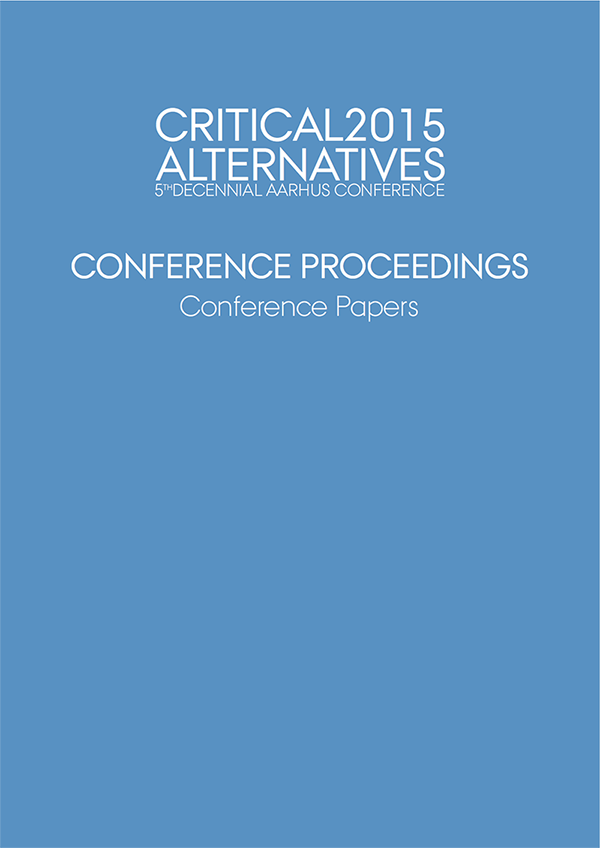The Future of Making: Where Industrial and Personal Fabrication Meet
DOI:
https://doi.org/10.7146/aahcc.v1i1.21394Nøgleord:
Personal fabrication, industrial fabrication, production, manufacturing, DIYResumé
This one-day workshop seeks to reflect on the notion of fab- rication in both personal and industrial contexts. Although these contexts are very distinct in their economical and polit- ical vision, they share important characteristics (e.g., users interacting with specific fabrication equipment and tools). The workshop topic spans from personal fabrication to (au- tomated) production, from applied to theoretical considera- tions, from user requirements to design as a crafting practice. We will address changes in production that affect humans, e.g., from mass production to Do-It-Yourself (DIY) produc- tion, in order to discuss findings and lessons learned for in- dividual and collective production workplaces of the future. We aim to explore the intersections between different dimen- sions and processes of production ranging all the way from hobbyist to professional making. Furthermore, the workshop will critically reflect on current developments and their conse- quences on personal, societal, and economical levels includ- ing questions of the reorganization of work and labor, inno- vation cultures, and politics of participation.
Referencer
Morgan G. Ames, Jeffrey Bardzell, Shaowen Bardzell, Silvia Lindtner, David A. Mellis, and Daniela K. Rosner. 2014. Making Cultures: Empowerment, Participation, and Democracy - or Not?. In Proceedings of the Extended Abstracts of the 32Nd Annual ACM Conference on Human Factors in Computing Systems (CHI EA ’14). ACM, New York, NY, USA, 1087–1092. DOI:http://dx.doi.org/10.1145/2559206.2579405
Kevin Ashton. 2009. That ‘internet of things’ thing. RFiD Journal 22, 7 (2009), 97–114.
Malte Brettel, Niklas Friederichsen, Michael Keller, and Marius Rosenberg. 2014. How virtualization, decentralization and network building change the manufacturing landscape: An Industry 4.0 Perspective. International Journal of Mechanical, Industrial Science and Engineering 8, 1 (2014), 37–44.
Amber Ferger, Wai Fai Lau, Philipp Ross, Wyman Zhao, Hiroki Sayama, and Steen Rasmussen. 2013. Impact of Personal Fabrication Technology on Social Structure and Wealth Distribution: An Agent-Based Simulation Study. In Advances in Artificial Life, ECAL, Vol. 12. 521–522.
Neil Gershenfeld. 2008. Fab: the coming revolution on your desktop–from personal computers to personal fabrication. Basic Books.
Scott E. Hudson. 2014. Printing Teddy Bears: A Technique for 3D Printing of Soft Interactive Objects. In Proceedings of the SIGCHI Conference on Human Factors in Computing Systems (CHI ’14). ACM, New York, NY, USA, 459–468. DOI: http://dx.doi.org/10.1145/2556288.2557338
Silvia Lindtner. 2012. Cultivating Creative China: Making and Remaking Cities, Citizens, Work and Innovation. University of California, Irvine.
Silvia Lindtner, Anna Greenspan, and David Li. 2014a. Shanzhai: China’s Collaborative Electronics-Design Ecosystem. (2014). http://www.theatlantic.com/technology/archive/ 2014/05/chinas- mass- production- system/370898/
Silvia Lindtner, Garnet D. Hertz, and Paul Dourish. 2014b. Emerging Sites of HCI Innovation: Hackerspaces, Hardware Startups & Incubators. In Proceedings of the SIGCHI Conference on Human Factors in Computing Systems (CHI ’14). ACM, New York, NY, USA, 439–448. DOI: http://dx.doi.org/10.1145/2556288.2557132
Hod Lipson and Melba Kurman. 2010. Factory@ home: The emerging economy of personal fabrication. A report commissioned by the US Office of Science and Technology Policy (2010).
David A. Mellis and Leah Buechley. 2012. Case Studies in the Personal Fabrication of Electronic Products. In Proceedings of the Designing Interactive Systems Conference (DIS ’12). ACM, New York, NY, USA,
–277. DOI: http://dx.doi.org/10.1145/2317956.2317998
Catarina Mota. 2011. The Rise of Personal Fabrication. In Proceedings of the 8th ACM Conference on Creativity and Cognition (C&C ’11). ACM, New York, NY, USA, 279–288. DOI: http://dx.doi.org/10.1145/2069618.2069665
Stefanie Mueller, Pedro Lopes, and Patrick Baudisch. 2012. Interactive Construction: Interactive Fabrication of Functional Mechanical Devices. In Proceedings of the 25th Annual ACM Symposium on User Interface Software and Technology (UIST ’12). ACM, New York, NY, USA, 599–606. DOI: http://dx.doi.org/10.1145/2380116.2380191
Stefanie Mueller, Tobias Mohr, Kerstin Guenther, Johannes Frohnhofen, and Patrick Baudisch. 2014. faBrickation: Fast 3D Printing of Functional Objects by Integrating Construction Kit Building Blocks. In CHI ’14 Extended Abstracts on Human Factors in Computing Systems (CHI EA ’14). ACM, New York, NY, USA, 187–188. DOI: http://dx.doi.org/10.1145/2559206.2582209
Gina Neff. 2012. Venture labor: Work and the burden of risk in innovative industries. MIT Press.
Huansheng Ning and Ziou Wang. 2011. Future Internet of things architecture: like mankind neural system or social organization framework? Communications Letters, IEEE 15, 4 (2011), 461–463.
Daniela K. Rosner, Silvia Lindtner, Ingrid Erickson, Laura Forlano, Steven J. Jackson, and Beth Kolko. 2014. Making Cultures: Building Things & Building Communities. In Proceedings of the Companion Publication of the 17th ACM Conference on Computer Supported Cooperative Work & Social Computing (CSCW Companion ’14). ACM, New York, NY, USA, 113–116. DOI: http://dx.doi.org/10.1145/2556420.2556852
Joshua G. Tanenbaum, Amanda M. Williams, Audrey Desjardins, and Karen Tanenbaum. 2013. Democratizing Technology: Pleasure, Utility and Expressiveness in DIY and Maker Practice. In Proceedings of the SIGCHI Conference on Human Factors in Computing Systems (CHI ’13). ACM, New York, NY, USA, 2603–2612. DOI:http://dx.doi.org/10.1145/2470654.2481360
Peter-Paul Verbeek. 2011. Moralizing technology: Understanding and designing the morality of things. University of Chicago Press.
Mark Weiser. 1993. Some Computer Science Issues in Ubiquitous Computing. Commun. ACM 36, 7 (July 1993), 75–84. DOI: http://dx.doi.org/10.1145/159544.159617




